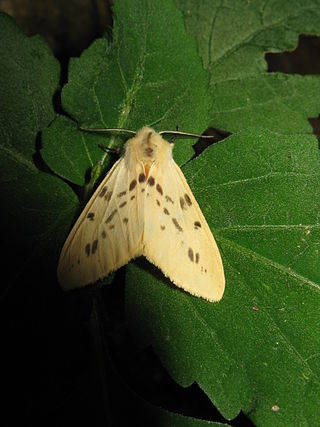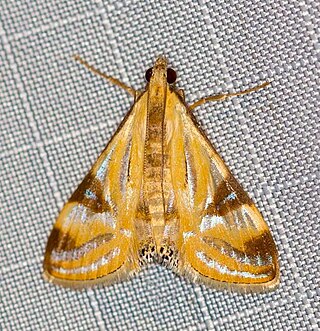
Francisco Morazán is one of the departments of Honduras.

Talanga is a town, with a population of 20,610, and a municipality in the Honduran department of Francisco Morazán.

Lemyra is a genus of tiger moths in the family Erebidae. The genus contains many species from East and South Asia, Sundaland and Australia. It was described by Francis Walker in 1856.
Chrysophyllis is a genus of the grass moth family (Crambidae). It is monotypic, containing the single species Chrysophyllis lucivaga. This moth is very little known, having only been recorded once, before 1935. It belongs to the large grass moth subfamily Spilomelinae; at the time of its description, these were still included in subfamily Pyraustinae and the entire Crambidae was then merged with the snout moths. While its exact relationships are undetermined, it is believed to be a close relative of Talanga. Like these, the male genitalia of C. lucivaga feature a remarkably elongated aedeagus shaped like a bullwhip.

Pycnarmon is a genus of moths of the family Crambidae described by Julius Lederer in 1863.

Talanga is a genus of moths of the family Crambidae described by Frederic Moore in 1885.

Talanga quadristigmalis is a species of moth of the family Crambidae. It was described by George Hamilton Kenrick in 1907 and is found in Papua New Guinea.

Talanga exquisitalis is a species of moth of the family Crambidae. It was described by George Hamilton Kenrick in 1907 and is found in Papua New Guinea.
Filodes sexpunctalis is a moth in the family Crambidae. It was described by Snellen in 1890. It is found in India (Darjeeling).
Pycnarmon sexpunctalis is a moth in the family Crambidae. It was described by George Hampson in 1912. It is found in the Democratic Republic of the Congo (Équateur), Nigeria and Sierra Leone.
Talanga iridomelaena is a moth in the family Crambidae. It was described by Eugene G. Munroe in 1968. It is found in New Britain.
Talanga nubilosa is a moth in the family Crambidae. It was described by Eugene G. Munroe in 1968. It is found in Papua New Guinea.
Talanga sabacusalis is a moth in the family Crambidae. It was described by Francis Walker in 1859. It is found on Borneo, Java, Sumatra, Sulawesi and in Papua New Guinea, Cambodia, the Philippines, as well as Australia, where it has been recorded from Queensland.

Talanga tolumnialis, the figleaf moth, is a moth in the family Crambidae. It was described by Francis Walker in 1859. It is found in Papua New Guinea and Australia, where it has been recorded from the Northern Territory, Queensland and New South Wales.
Talanga advenalis is a moth of the family Crambidae. It was described by Snellen in 1895. It is found in Indonesia (Java).
Talanga lucretila is a moth in the family Crambidae. It was described by Charles Swinhoe in 1901. It is found on the Solomon Islands.
Talanga pallidimargo is a moth in the family Crambidae. It was described by Joseph de Joannis in 1929. It is found in Vietnam.
Talanga talangalis is a moth in the family Crambidae. It was described by George Hampson in 1899. It is found in the Loyalty Islands in the Pacific Ocean east of Australia.

Margaroniini is a tribe of the species-rich subfamily Spilomelinae in the pyraloid moth family Crambidae. The tribe was erected by Charles Swinhoe and Everard Charles Cotes in 1889, originally as family Margaronidae.
This page is based on this
Wikipedia article Text is available under the
CC BY-SA 4.0 license; additional terms may apply.
Images, videos and audio are available under their respective licenses.









